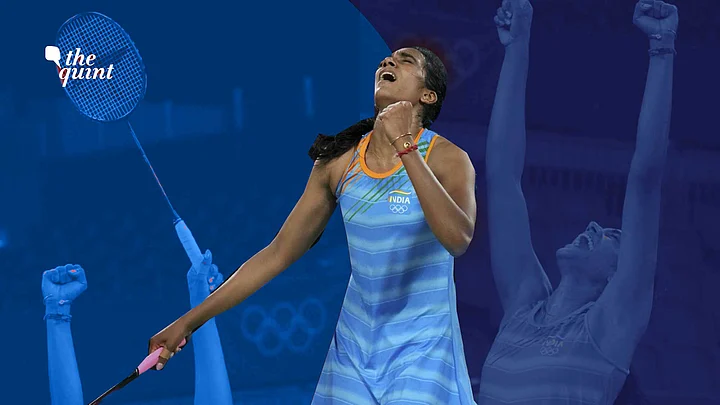She was a fine study of being in the flow as PV Sindhu powered her way – and smartly at that – to her second successive Olympic Games podium in the Musashino Forest Plaza in Tokyo on Sunday. Her facile 21-13, 21-15 victory over China’s He Bing Jiao was testimony to her ability to keep the mind from swinging either to the past or the future.
Sindhu’s impressive physical and emotional recovery from the aftermath of the loss to Tai Tzu-Ying in the semifinals on Saturday exemplified her talent of being present in the moment and getting the job done. Of course, she would be the first to acknowledge that coach Park Tae-Sang played no mean role in preparing her rebound.
In fact, a standout feature of Sindhu’s entire campaign to get the medal in Tokyo 2020 is her ability to keep her focus sharp through difficult times – and I am not speaking only about the pandemic here but also potential road bumps with changes in coaching staff and training location. After all, it is never easy to adapt to change, let alone envision it and then embrace it.
Changing Tracks Decisively
There seemed to be a time last year when some thought that her attention seemed to waver just that wee bit away from sport. But her trip to England helped her understand herself, not just her body, and she plotted her Olympic journey with a clear vision that underlined her growing desire to take control of her own career path.
Many saw her decision to move away from National Coach Pullela Gopichand’s direct tutelage to being with coach Park Tae-Sang as being akin to changing horses in the midstream. Who, in the right frame of mind, would leave a coach who helped one to an Olympic Games final in 2016 and multiple World Championships medals?
Of course, Sindhu was already working with Korean coach Kim Ji Hyun when she won the World Championship in 2019. As her luck would have it, Kim resigned within a month and India’s top player faced a dilemma. She made a tough choice and stuck with it unmindful of what anyone else’s opinion was.
Sindhu remained steadfast that she needed different inputs to be able to get that second Olympic medal. After all, the other players knew her game and would be ready to take her on. After some hiccups, the two settled down with single-minded purpose. Park Tae-Sang’s coaching brought some variety into her strokes and a calmness to an already smart court craft.
For whatever reason the training was moved from the Pullela Gopichand Badminton Academy to the neighbouring Gachibowli Stadium, it proved a decisive shift. Sindhu was not only able to train with peace of mind but also got prepared to the idea of playing in a large arena with no spectators and the sound of the racquet strings hitting the shuttle being heard.
Rising to the Occasion, Again
Saina Nehwal was indeed a pathbreaker, being the first Indian badminton player to win an Olympic medal in 2012. Since then, Sindhu has carved her own niche, adding a second Olympic medal to her growing milestones. It is never easy being a path-breaker, especially with so much scrutiny in India.
On Sunday, with acute awareness that returning empty-handed from Tokyo would open Sindhu up to an inquisition, no less, coach Park Tae-Sang did what is expected of a fine coach: fired her up, possibly with the right triggers, reminding her of the values that she stood for and her own potential as a player. It resonated with her – and she was different player on court.
Playing with pride, a composed Sindhu returned to the arena seemingly eager to enjoy the contest with He Bing Jiao, bringing her aggressive play to the fore against the left-hander. She showed a bit more love for battle than her opponent, whom she has squared up with for a good six years and more.
Nothing else mattered. Not the negative head-to-head record. Not her victory in a group match in the World Tour Final in 2019 after four successive defeats in 2018 and 2019. And, certainly not any memories of the loss at Tai Tzu-Ying’s hands barely 24 hours earlier. What mattered was her intent and the desire to bring her best game to the table.
And, after an hour of winning the key moments, Sindhu stood on court, looking heavenward after sealing her place in the pantheon of India’s Olympic legends. She would have missed seeing Park Tae-Sang’s impulsive reaction – clenched fists, one punching the air. Even the mask that he wore through the match could not hide his beaming smile from the world.
Thousands of words will be written in the coming days. Countless hours of discussions will be beamed from TV studios. Those may all be forgotten with time. However, the impact of her two Olympic back-to-back medals will be long felt in the Indian landscape, with many more youngsters embracing her as their inspiration. And that will be Sindhu’s lasting legacy.
(At The Quint, we question everything. Play an active role in shaping our journalism by becoming a member today.)
